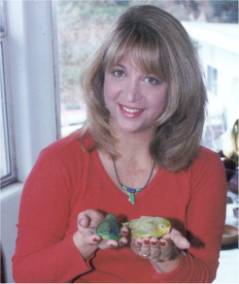Hi Sandee
My name is Dena. I have only recently been breeding Parrotlets, not for profit, just for fun. I have been told that you will answer parrotlet questions when people write to you, Sooo, here's hoping. I have an adult American white male and a blue female. They have had 2 clutches this year, one in March, the other in May. I pulled the babies from the second clutch last week to hand feed them, that is going well. I removed the nest box from the parents thinking this would discourage breeding for a while but unfortunately I see he is breeding her several times a day. My first question is, should I throw the eggs away this time or is it safe to let her have a third clutch at this time? They had 4 the first time and 5 the second time. I am not an indiscriminate breeder and I want to do what is best for my adult birds. Also, Do you know any other ways to discourage breeding short of separating them? They screem constantly when they are separated. I would appreciate any advice you can give me. I have read several of your books and I think you are the Master of parrotlets and their breeding. Thank you so much for taking the time to read this. Sincerely. Dena
Dear Dena:
Thank you for your email.
Unfortunately, when you place two adult birds together and provide them with nutritious food, a secure place to live and a nest box, they will do what Nature intended and they will breed. With some pairs, simply removing the nestbox will stop them from breeding; others you need to separate them. Yes, it is inconvenient for us to listen to them call to one another for a few days but eventually they will stop. I know people think they are suffering emotionally but I’ve never heard of a parrotlet dying from being separated from a mate. I have heard them dying because they just keep breeding and breeding. It is much more important for them to rest – if they are allowed to continue breeding indiscriminately, the hen will deplete her body of calcium and she can become egg-bound or worse such as having a collapsed uterus. It will also shorten her lifespan as well as her breeding life. Hens that have more than 3 clutches a year generally only produce for 3 years while hens that are managed with restricted breeding will continue breeding until 7 years or more.
Males can also suffer from exhaustion if they are constantly feeding the hen and chicks. Many males do not eat as much as they normally do when they are feeding a clutch so they can starve to death or develop a stress-related illness. This can be passed onto the hen and chicks and you can lose not only your male but the hen and babies as well.
The physically exhausting part of breeding for a hen is producing the eggs. That is what depletes the body of calcium and causes the stress which can result in birth-related such as egg binding and prolapse of the uterus. There is no point in removing the eggs at this point since the most dangerous part of breeding is over for her. If you remove the eggs at this point, she may just start her cycle all over again since this is what would happen in the wild. After all, again, Nature designed these birds to survive in the wild and we cannot undo that instinct just because we keep them in captivity. Instead, we have to manage them in order to protect them and ensure they are healthy and strong and produce healthy offspring. Again, its not about emotion or ‘what the birds want’ it is about instinct and biology.
If they were my birds, I’d let them finish out this clutch then either take the box down or separate them for 2-3 months. Again, it may be difficult but no one said breeding birds is easy or fun. In fact, I give a very in depth presentation on how hard it is to breed birds – the decisions that have to be made, the sacrifices we as breeders have to make and the amount of work, resources, time and money that are involved. It isn’t easy nor is it always fun but if you want to be serious about breeding – and that has nothing do with making money – it has to do with the ethical considerations when breeding birds.
I hope this helps.
Sincerely yours,
Sandee L. Molenda, C.A.S.
The Parrotlet Ranch, Owner, www.parrotletranch.com
Join the International Parrotlet Society, – the World’s Largest and Oldest Parrotlet Organization www.internationalparrotletsociety.org
A Chattering Bird Builds No Nest.
Camaroonian Phrase
Subscribe to:
Post Comments (Atom)




No comments:
Post a Comment
Note: Only a member of this blog may post a comment.